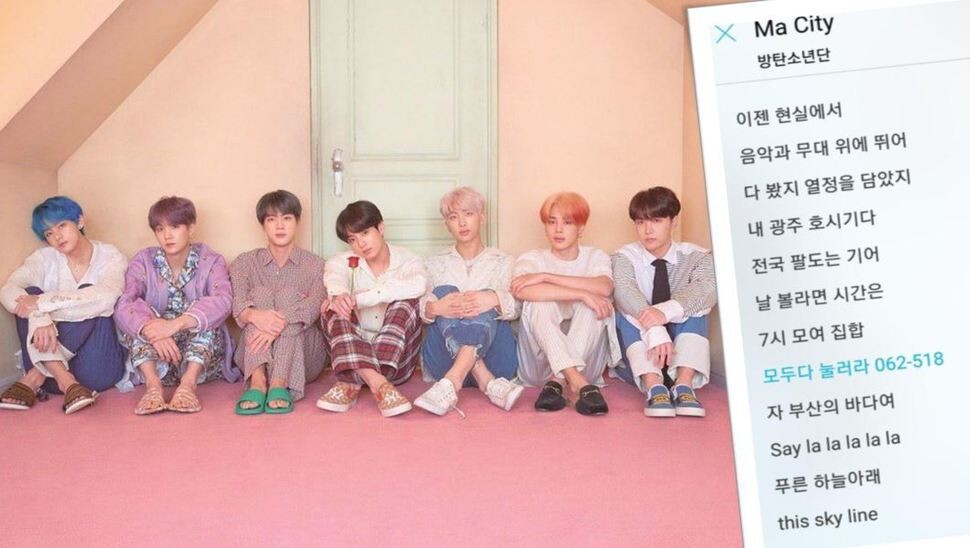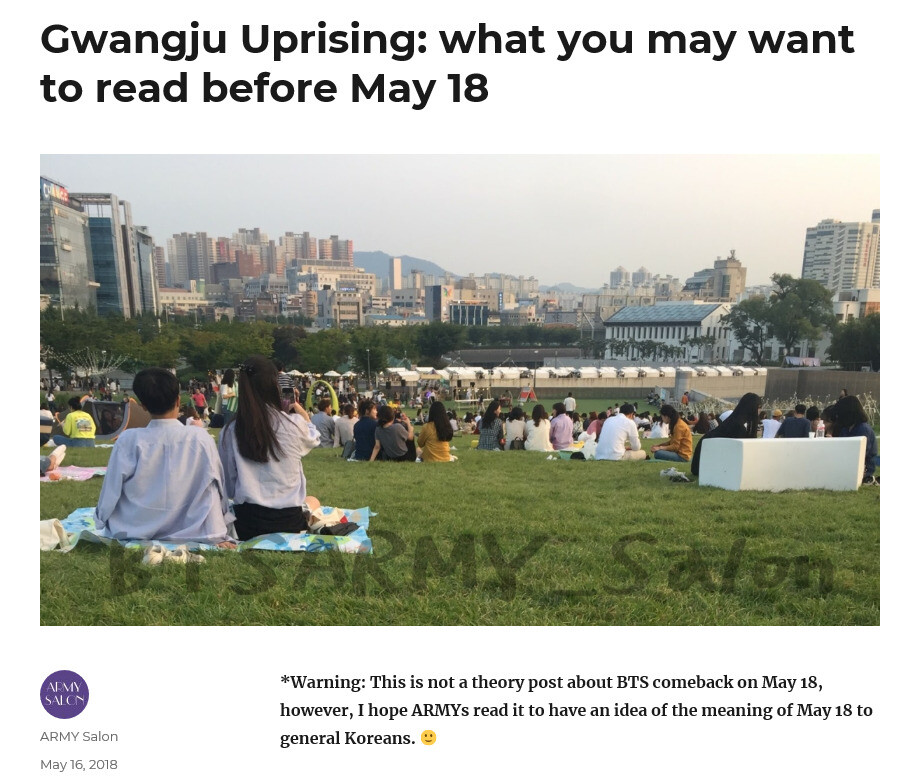hankyoreh
Links to other country sites 다른 나라 사이트 링크
BTS fans learn about Gwangju Democratization Movement through lyrics

“If you listen to ‘Ma City’ by BTS, you will hear J-Hope rapping ‘Press 062-518, everyone.’ 062 is the area code of Gwangju and 518 is referring to Gwangju Uprising happened [sic] on May 18.”
This message was posted on a blog by a user identifying themselves as a member of the BTS “Army” (fan club). It was published in May 2018 by @BTSARMY_Salon, a Twitter user who posts English translations of BTS song lyrics and related articles. Describing the May 18 Democratization Movement on 1980 in the post, the user wrote, “On May 18-23 of 1980, hundreds of innocent citizens in Gwangju shedded their bloods [sic] while fighting for democracy. During this period, Gwangju citizens were demonstrating against the Chun Doo-hwan government.”
The Twitter account had over 127,000 followers at the time of the post, with more than 4,000 retweets of the post.
More and more overseas “BTS Army” members are following the group’s lead in learning more about the May 1980 Gwangju Democratization Movement. The trend was sparked by the lyrics to BTS songs. “Ma City,” a song on the group’s 2015 album “The Most Beautiful Moment in Life, Pt. 2,” has lyrics written by three of the members – including Gwangju native J-Hope (birth name Jeong Ho-seok, 25) – about the cities where they grew up. In the song, J-Hope raps, “I’m a South Jeolla Gwangju baby” and “If you want to see me, get together at seven o’clock, everyone dial 062-518.” The “get together at seven o’clock” lyric was a comeback regarding the site Ilbe’s derogatory use of “seven o’clock” to refer to Gwangju due to its position at roughly seven o’clock on a map of South Korea.

In the wake of “Ma City,” overseas fans have become curious about the meanings of “seven o’clock” and “062-518.” In 2016, an Army member posted a blog message in English explaining the lyrics of the song.
“Ilbe claims that the May 18 Democracy Movement was the result of a conspiracy with the North Korean military, but there is no basis for that,” the member said. Overseas Army members left replies thanking the poster for explaining the lyrics’ meaning.
“I had no idea Gwangju has such a sad history,” one wrote.
Some overseas Army members made the news for visiting the May 18th National Cemetery and leaving flowers on Apr. 28 while visiting Gwangju for a BTS performance. In a May 16 telephone interview with the Hankyoreh, Ukrainian Army member Anastasia Zotova, 21, explained, “I learned about the May 1980 Democracy Member through a BTS song. Before we left to see the concert, some friends and I visited the cemetery.”
“I would never have known about this important event had I had not heard that BTS song,” she added.
By Oh Yeon-seo, staff reporter
Please direct comments or questions to [english@hani.co.kr]
Editorial・opinion
![[Column] Park Geun-hye déjà vu in Yoon Suk-yeol [Column] Park Geun-hye déjà vu in Yoon Suk-yeol](https://flexible.img.hani.co.kr/flexible/normal/500/300/imgdb/original/2024/0424/651713945113788.jpg) [Column] Park Geun-hye déjà vu in Yoon Suk-yeol
[Column] Park Geun-hye déjà vu in Yoon Suk-yeol![[Editorial] New weight of N. Korea’s nuclear threats makes dialogue all the more urgent [Editorial] New weight of N. Korea’s nuclear threats makes dialogue all the more urgent](https://flexible.img.hani.co.kr/flexible/normal/500/300/imgdb/original/2024/0424/7317139454662664.jpg) [Editorial] New weight of N. Korea’s nuclear threats makes dialogue all the more urgent
[Editorial] New weight of N. Korea’s nuclear threats makes dialogue all the more urgent- [Guest essay] The real reason Korea’s new right wants to dub Rhee a founding father
- [Column] ‘Choson’: Is it time we start referring to N. Korea in its own terms?
- [Editorial] Japan’s rewriting of history with Korea has gone too far
- [Column] The president’s questionable capacity for dialogue
- [Column] Are chaebol firms just pizza pies for families to divvy up as they please?
- [Column] Has Korea, too, crossed the Rubicon on China?
- [Correspondent’s column] In Japan’s alliance with US, echoes of its past alliances with UK
- [Editorial] Does Yoon think the Korean public is wrong?
Most viewed articles
- 1‘We must say no’: Seoul defense chief on Korean, USFK involvement in hypothetical Taiwan crisis
- 2N. Korean delegation’s trip to Iran shows how Pyongyang is leveraging ties with Moscow
- 3Amnesty notes ‘erosion’ of freedom of expression in Korea in annual human rights report
- 4‘Weddingflation’ breaks the bank for Korean couples-to-be
- 5[Reportage] On US campuses, student risk arrest as they call for divestment from Israel
- 6[Column] Park Geun-hye déjà vu in Yoon Suk-yeol
- 7Korea sees more deaths than births for 52nd consecutive month in February
- 8[Editorial] New weight of N. Korea’s nuclear threats makes dialogue all the more urgent
- 9Will NewJeans end up collateral damage in internal feud at K-pop juggernaut Hybe?
- 10[Guest essay] The real reason Korea’s new right wants to dub Rhee a founding father